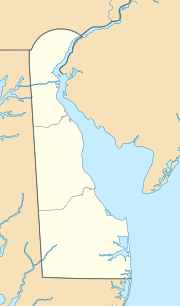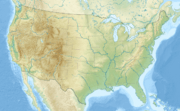Middle Run (White Clay Creek tributary) facts for kids
Quick facts for kids Middle Run |
|
|---|---|
| Other name(s) | Tributary to White Clay Creek |
| Country | United States |
| State | Delaware |
| County | New Castle |
| Physical characteristics | |
| Main source | White Clay Creek divide Estates at Corner Ketch, Delaware 300 ft (91 m) 39°44′45″N 075°44′23″W / 39.74583°N 75.73972°W |
| River mouth | White Clay Creek Delaplane Manor, Delaware 46 ft (14 m) 39°41′36″N 075°43′11″W / 39.69333°N 75.71972°W |
| Length | 4.28 mi (6.89 km) |
| Basin features | |
| Progression | generally south |
| River system | Christina River |
| Basin size | 3.92 square miles (10.2 km2) |
| Tributaries |
|
| Bridges | DE 72, Foxden Road, Old Possum Park Road, Possum Park Road, DE 2 |
Middle Run is a small stream, about 4.28 mi (6.89 km) long, located in New Castle County, Delaware. It's a "2nd order tributary," which means it's a stream that flows into a larger stream, which then flows into an even bigger river. Middle Run eventually joins White Clay Creek.
What's in a Name?
Middle Run has also been known by another name in the past. According to the Geographic Names Information System, people sometimes called it "Muddy Run." This might have been because of the way the water looked after heavy rains.
Where Does Middle Run Flow?
Middle Run starts in an area called the Estates at Corner Ketch, in New Castle County, Delaware. This starting point is on the land that divides the water flowing into White Clay Creek.
From there, Middle Run flows generally south. It travels through the landscape until it reaches Delaplane, Delaware. This is where it meets and empties into White Clay Creek.
The Middle Run Watershed
A watershed is like a big bowl that collects all the rain and snowmelt in an area, directing it into a specific stream or river. The Middle Run watershed covers about 3.92 square miles (10.2 km2) of land.
This area gets a good amount of rain each year, around 46.1 inches. A significant part of the watershed, about 32.8%, is covered by forests. These forests are important because they help filter the water and provide homes for wildlife.
 | James B. Knighten |
 | Azellia White |
 | Willa Brown |



